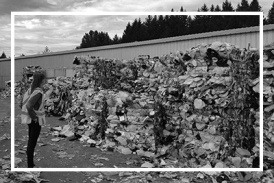Canada Invests Millions in Sustainable Mining Technology: Roberto Guzmán García
The integration of smart sensors and monitoring tools has facilitated predictive maintenance, allowing interventions only when truly necessary.
Automation and the implementation of new technologies have allowed the industry to enhance productivity, increasing operational efficiency and reducing labor costs. “In this regard, solutions such as data analysis systems have helped optimize processes, boosting material recovery and enabling companies to achieve superior energy performance,” says finance expert Roberto Guzmán García.
The impact of technology in the mining industry is evident in various areas. The integration of smart sensors and monitoring tools has facilitated predictive maintenance, allowing interventions only when truly necessary and thus preventing unforeseen failures.
This approach reduces downtime and improves operational efficiency. Additionally, advances in automation have helped improve safety at extraction sites by assigning high-risk tasks to robotic equipment, reducing workers’ exposure to hazardous conditions.
In countries like Canada, technological innovation has been a determining factor in transforming the mining sector. The incorporation of autonomous vehicles, drones, and advanced data analytics systems has redefined traditional methods of mineral extraction and processing. These tools not only increase productivity and safety but also help companies comply with stricter environmental regulations, reducing their ecological footprint.
The Canadian government has introduced initiatives to speed up the adoption of new technologies in the mining industry. Programs such as the Strategic Innovation Fund have allocated resources for projects that improve sustainability and safety in extractive operations.
Moreover, strategic partnerships among mining companies, technology providers, and academic institutions have facilitated the implementation of innovative solutions throughout the entire value chain of the sector.
Canada has solidified its reputation as a leader in sustainable mining due to its focus on innovation and energy efficiency. Local companies have developed technologies that reduce water consumption in mineral extraction, lowering the environmental impact of operations. The use of artificial intelligence and machine learning has optimized the identification of deposits, enabling more precise and less invasive explorations.
The country has also encouraged the shift to clean energy sources within the mining sector. The integration of renewable energy in mines has lessened dependence on fossil fuels, resulting in lower carbon emissions.
These initiatives position Canada as a leader in responsible mining, attracting investments and promoting a model of sustainable development. Recent industry studies show that over 60% of mining companies in Canada have adopted energy efficiency technologies in the last five years, indicating a significant shift in their operational practices.
“Innovative technologies not only improve efficiency, but they also strengthen companies positioning in a global market that demands responsible and sustainable practices,” says Roberto Guzmán García. Thus, adopting more efficient operational models not only addresses the need to reduce costs but also represents a long-term competitive advantage.
The integration of advanced solutions not only optimizes operations and improves safety, but it also reinforces the industry’s commitment to sustainability. With government initiatives and collaboration among key stakeholders, mining is on track to become a more efficient and responsible global industry.
Marcela Aguilar
Independent
email us here
Visit us on social media:
LinkedIn
Instagram
Facebook
YouTube
Legal Disclaimer:
EIN Presswire provides this news content "as is" without warranty of any kind. We do not accept any responsibility or liability for the accuracy, content, images, videos, licenses, completeness, legality, or reliability of the information contained in this article. If you have any complaints or copyright issues related to this article, kindly contact the author above.
Exciting Announcement: ASEAN Smart Energy & Energy Storage Expo-ASEE 2026
Get Bats Out Releases All-New 2025 Homeowner’s Guide to Bat Removal
Global Facial Oil Market to Hit USD 4.3 Billion by 2035 Amid Rising Demand for Natural and Organic Skincare Products
Kalendarium
Więcej ważnych informacji
 Jedynka Newserii
Jedynka Newserii

 Jedynka Newserii
Jedynka Newserii

Handel

Ze względu na różnice w cenach surowce wtórne przegrywają z pierwotnymi. To powoduje problemy branży recyklingowej
Rozporządzenie PPWR stawia ambitne cele w zakresie wykorzystania recyklatów w poszczególnych rodzajach opakowań. To będzie oznaczało wzrost popytu na materiały wtórne pochodzące z recyklingu. Obecnie problemy branży recyklingu mogą spowodować, że popyt będzie zaspokajany głównie przez import. Dziś do dobrowolnego wykorzystania recyklatów nie zachęcają przede wszystkim ceny – surowiec pierwotny można kupić taniej niż ten z recyklingu.
Przemysł spożywczy
Rośnie presja konkurencyjna na unijne rolnictwo. Bez rekompensat sytuacja rolników może się pogarszać

Rolnictwo i żywność, w tym rybołówstwo, są sektorami strategicznymi dla UE. System rolno-spożywczy, oparty na jednolitym rynku europejskim, wytwarza ponad 900 mld euro wartości dodanej. Jego konkurencyjność stoi jednak przed wieloma wyzwaniami – to przede wszystkim eksport z Ukrainy i niedługo także z krajów Mercosur, a także presja związana z oczekiwaniami konsumentów i Zielonym Ładem. Bez rekompensat rolnikom może być trudno tym wyzwaniom sprostać.
Transport
Infrastruktury ładowania elektryków przybywa w szybkim tempie. Inwestorzy jednak napotykają szereg barier

Liczba punktów ładowania samochodów elektrycznych wynosi dziś ok. 10 tys., a tempo wzrostu wynosi ok. 50 proc. r/r. Dynamika ta przez wiele miesięcy była wyższa niż wyniki samego rynku samochodów elektrycznych, na które w poprzednim roku wpływało zawieszenie rządowych dopłat do zakupu elektryka. Pierwszy kwartał br. zamknął się 22-proc. wzrostem liczby rejestracji w ujęciu rocznym, ale kwiecień przyniósł już wyraźne odbicie – o 100 proc.
Partner serwisu
Szkolenia

Akademia Newserii
Akademia Newserii to projekt, w ramach którego najlepsi polscy dziennikarze biznesowi, giełdowi oraz lifestylowi, a także szkoleniowcy z wieloletnim doświadczeniem dzielą się swoją wiedzą nt. pracy z mediami.









.gif)

 |
| |
| |
|